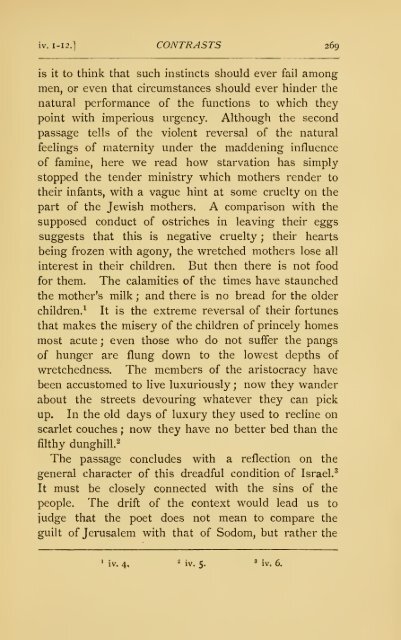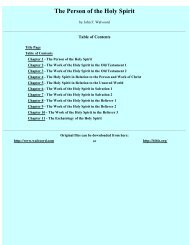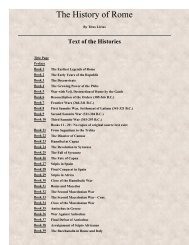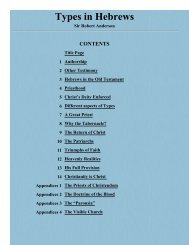- Page 2:
JFrom tl|f iCibrarif of 15^r|ueatl|
- Page 8 and 9:
THE EXPOSITOR'S BIBLE Cnrnm Svo, cl
- Page 11 and 12:
CONTENTS THE SONG OF SOLOMON CHAPTE
- Page 13 and 14:
PROPHETS WITHOUT A VISION ii. 9. 14
- Page 15:
THE SONG OF SOLOMON
- Page 18 and 19:
THE SONG OF SOLOMON Goethe in the w
- Page 20 and 21:
THE SONG OF SOLOMON by a sentence t
- Page 22 and 23:
THE SONG OF SOLOMON the shepherd sp
- Page 24 and 25:
THE SONG OF SOLOMON something more
- Page 26 and 27:
THE SONG OF SOLOMON attracted atten
- Page 28 and 29:
THE SONG OF SOLOMON scornful condem
- Page 30 and 31:
i6 THE SONG OF SOLOMON ladies of. t
- Page 32 and 33:
t8 The song of Solomon of many a we
- Page 34 and 35:
THE SONG OF SOLOMON screened her fr
- Page 36 and 37:
THE SONG OF SOLOMON the spirit of a
- Page 38 and 39:
24 THE SONG OF SOLOMON sheba ! The
- Page 40 and 41:
26 THE SONG OF SOLOMON a sealed fou
- Page 42 and 43:
WE CHAPTER III LOVE UNQUENCHABLE Ch
- Page 44 and 45:
3o THE SONG OF SOLOMON beloved ? ^
- Page 46 and 47:
THE SONG OF SOLOMON We have now rea
- Page 48 and 49:
34 THE SONG OF SOLOMON In this figu
- Page 50 and 51:
36 THE SONG OF SOLOMON the series o
- Page 52 and 53:
38 THE SONG OF SOLOMON constancy to
- Page 54 and 55:
THE SONG OF SOLOMON represents the
- Page 56 and 57:
42 THE SONG OF SOLOMON be regarded
- Page 58 and 59:
THE SONG OF SOLOMON method has been
- Page 60 and 61:
46 THE SONG OF SOLOMON the author.
- Page 62 and 63:
THE SONG OF SOLOMON Solomon. We mus
- Page 64 and 65:
i;o THE SONG OF SOLOMON But the rel
- Page 66 and 67:
52 THE SONG OF SOLOMON which are co
- Page 68 and 69:
54 THE SONG OF SOLOMON Bible that i
- Page 70 and 71:
S6 THE SONG OF SOLOMON because it h
- Page 72 and 73:
58 THE LAMENTATIONS OF JEREMIAH bes
- Page 75:
THE LAMENTATIONS OF JEREMIAH
- Page 78 and 79:
64 THE LAMENTATIONS OF JEREMIAH on
- Page 80 and 81:
66 THE LAMENTATIONS OF JEREMIAH the
- Page 82 and 83:
68 THE LAMENTATIONS OF JEREMIAH a s
- Page 84 and 85:
70 THE LAMENTATIONS OF JEREMIAH the
- Page 86 and 87:
72 THE LAMENTATIONS OF JEREMIAH dem
- Page 88 and 89:
74 THE LAMENTATIONS OF JEREMIAH ima
- Page 90 and 91:
75 THE LAMENTA TIONS OF JEREMIAH mo
- Page 92 and 93:
78 THE LAMENTATIONS OF JEREMIAH sce
- Page 94 and 95:
So THE LAMENTATIONS OF JEREMIAH his
- Page 96 and 97:
82 THE LAMENTATIONS OF JEREMIAH wit
- Page 98 and 99:
84 THE LAMENTATIONS OF JEREMIAH poi
- Page 100 and 101:
86 THE LAMENTATIONS OF JEREMIAH dur
- Page 102 and 103:
— — 88 THE LAMENTATIONS OF JERE
- Page 104 and 105:
90 THE LAMENTATIONS OE JEREMIAH sha
- Page 106 and 107:
92 THE LAMENTATIONS OF JEREMIAH a s
- Page 108 and 109:
94 THE LAMENTATIONS OF JEREMIAH men
- Page 110 and 111:
96 THE LAMENTATIONS OF JEREMIAH Sti
- Page 112 and 113:
98 THE LAMENTA TIONS OF JEREMIAH ta
- Page 114 and 115:
THE LAMENTATIONS OF JEREMIAH presen
- Page 116 and 117:
I02 THE LAMENTATIONS OF JEREMIAH co
- Page 118 and 119:
104 THE LAMENTATIONS OF JEREMIAH en
- Page 120 and 121:
io6 THE LAMENTATIONS OF JEREMIAH sh
- Page 122 and 123:
THE CHAPTER V SIN AND SUFFERING i.
- Page 124 and 125:
THE LAMENTATIONS OF JEREMIAH profou
- Page 126 and 127:
THE LAMENTATIONS OF JEREMIAH the fo
- Page 128 and 129:
114 THE LAMENTATIONS OF JEREMIAH Th
- Page 130 and 131:
ii6 THE LAMENTATIONS OF JEREMIAH be
- Page 132 and 133:
THE LAMENTATIONS OF JEREMIAH A\Teck
- Page 134 and 135:
IN CHAPTER VI ZION'S APPEAL the lat
- Page 136 and 137:
122 THE LAMENTATIONS OF JEREMIAH we
- Page 138 and 139:
124 THE LAMENTATIONS OF JEREMIAH pa
- Page 140 and 141:
126 THE LAMENTATIONS OF JEREMIAH an
- Page 142 and 143:
12S THE LAMENTATIONS OF JEREMIAH th
- Page 144 and 145:
I30 THE LAMENTATIONS OF JEREMIAH Th
- Page 146 and 147:
THE CHAPTER Vll GOD AS AN ENEMY ele
- Page 148 and 149:
134 THE LAMENTATIONS OF JEREMIAH pe
- Page 150 and 151:
136 THE LAMENTATIONS OF JEREMIAH el
- Page 152 and 153:
138 THE LAMENTATIONS OF JEREMIAH Th
- Page 154 and 155:
I40 THE LAMENTATIONS OF JEREMIAH ch
- Page 156 and 157:
142 THE LAMENTATIONS OF JEREMIAH co
- Page 158 and 159:
CHAPTER VIII THE CRY OF THE CHHDREN
- Page 160 and 161:
146 THE LAMENTATIONS OF JEREMIAH no
- Page 162 and 163:
148 THE LAMENTATIONS OF JEREMIAH of
- Page 164 and 165:
I50 THE LAMENTATIONS OF JEREMIAH by
- Page 166 and 167:
152 THE LAMENTATIONS OF JEREMIAH th
- Page 168 and 169:
154 THE LAMENTATIONS OF JEREMIAH ce
- Page 170 and 171:
IN CHAPTER IX PROPHETS WITHOUT A VI
- Page 172 and 173:
IS8 THE LAMENTATIONS OF JEREMIAH fo
- Page 174 and 175:
i6o THE LAMENTATIONS OF JEREMIAH pe
- Page 176 and 177:
i62 THE LAMENTATIONS OF JEREMIAH wh
- Page 178 and 179:
i64 THE LAMENTATIONS OF JEREMIAH bu
- Page 180 and 181:
i66 THE LAMENTATIONS OF JEREMIAH be
- Page 182 and 183:
IT CHAPTER X THE CALL TO PRAYER is
- Page 184 and 185:
170 THE LAMENTATIONS OF JEREMIAH th
- Page 186 and 187:
172 THE LAMENTATIONS OF JEREMIAH wa
- Page 188 and 189:
174 THE LAMENTATIONS OF JEREMIAH >
- Page 190 and 191:
176 THE LAMENTATIONS OF JEREMIAH Lo
- Page 192 and 193:
178 THE LAMENTATIONS OF JEREMIAH th
- Page 194 and 195:
CHAPTER XI THE MAN THAT HATH SEEN A
- Page 196 and 197:
1 82 THE LAMENTATIONS OF JEREMIAH t
- Page 198 and 199:
i84 THE LAMENTATIONS OF JEREMIAH aw
- Page 200 and 201:
i86 THE LAMENTATIONS OF JEREMIAH th
- Page 202 and 203:
1 88 THE LAMENTATIONS OF JEREMIAH H
- Page 204 and 205:
I90 THE LAMENTATIONS OF JEREMIAH ou
- Page 206 and 207:
THE LAMENTATIONS OF JEREMIAH instan
- Page 208 and 209:
CHAPTER XII THE UNFAILING GOODNESS
- Page 210 and 211:
196 THE LAMENTATIONS OF JEREMIAH fl
- Page 212 and 213:
198 THE LAMENTATIONS OF JEREMIAH th
- Page 214 and 215:
200 THE LAMENTA TIONS OF JEREMIAH p
- Page 216 and 217:
THE LAMENTATIONS OF JEREMIAH shew H
- Page 218 and 219:
204 THE LAMENTATIONS OF JEREMIAH th
- Page 220 and 221:
HAVING CHAPTER XIII QUIET IVAITING
- Page 222 and 223:
2o8 THE LAMENTATIONS OF JEREMIAH be
- Page 224 and 225:
2IO THE LAMENTATIONS OF JEREMIAH he
- Page 226 and 227:
212 THE LAMENTATIONS OF JEREMIAH re
- Page 228 and 229:
214 THE LAMENTATIONS OF JEREMIAH of
- Page 230 and 231:
2i6 THE LAMENTATIONS OF JEREMIAH aw
- Page 232 and 233: THE CHAPTER XIV GOD AND EVIL iii. 3
- Page 234 and 235: THE LAMENTATIONS OF JEREMIAH appare
- Page 236 and 237: THE LAMENTATIONS OF JEREMIAH then c
- Page 238 and 239: 224 THE LAMENTATIONS OF JEREMIAH th
- Page 240 and 241: 226 THE LAMENTATIONS OF JEREMIAH un
- Page 242 and 243: -2S THE LAMENTATIONS OF JEREMIAH th
- Page 244 and 245: WHEN CHAPTER XV THE RETURN iii. 40-
- Page 246 and 247: 232 THE LAMENTATIONS UE JEREMIAH hi
- Page 248 and 249: 234 THE LAMENTATIONS OF JEREMIAH as
- Page 250 and 251: 236 THE LAMENTATIONS OF JEREMIAH of
- Page 252 and 253: 238 THE LAMENTATIONS OF JEREMIAH co
- Page 254 and 255: THE LAMENTATIONS OE JEREMIAH is of
- Page 256 and 257: AS CHAPTER XVI GRIEVING BEFORE GOD
- Page 258 and 259: THE LAMENTATIONS OF JEREMIAH despai
- Page 260 and 261: 246 THE LAMENTATIONS OF JEREMIAH lo
- Page 262 and 263: 248 THE LAMENTATIONS OF JEREMIAH pi
- Page 264 and 265: 250 THE LAMENTATIONS OF JEREMIAH th
- Page 266 and 267: 252 THE LAMENTATIONS OF JEREMIAH in
- Page 268 and 269: 254 THE LAMENTATIONS OF JEREMIAH mo
- Page 270 and 271: 256 THE LAMENTATIONS OF JEREMIAH pr
- Page 272 and 273: 258 THE LAMENTATIONS OF JEREMIAH un
- Page 274 and 275: 26o THE LAMENTATIONS OF JEREMIAH tr
- Page 276 and 277: 262 THE LAMENTATIONS OF JEREMIAH op
- Page 278 and 279: 264 T^HE LAMENTA TIONS OF JEREMIAH
- Page 280 and 281: 266 THE LAMENTATIONS OF JEREMIAH us
- Page 284 and 285: 270 THE LAMENTATIONS OF JEREMIAH fa
- Page 286 and 287: 272 THE LAMENTATIONS OF JEREMIAH Th
- Page 288 and 289: 274 THE LAMENTATIONS OF JEREMIAH wh
- Page 290 and 291: 276 THE LAMENTATIONS OF JEREMIAH wo
- Page 292 and 293: 278 THE LAMENTATIONS OF JEREMIAH as
- Page 294 and 295: 28o THE LAMENTATIONS OF JEREMIAH in
- Page 296 and 297: 282 THE LAMENTATIONS OF JEREMIAH al
- Page 298 and 299: 284 THE LAMENTATIONS OF JEREMIAH mi
- Page 300 and 301: 286 THE LAMENTATIONS OE JEREMIAH th
- Page 302 and 303: THE CHAPTER XX VAIN HOPES iv. 17-20
- Page 304 and 305: 290 THE LAMENTATIONS OF JEREMIAH hi
- Page 306 and 307: 292 THE LAMENTATIONS OF JEREMIAH Ne
- Page 308 and 309: 294 THE LAMENTATIONS OF JEREMIAH To
- Page 310 and 311: 2,6 THE LAMENTATIONS OF JEREMIAH pr
- Page 312 and 313: 298 THE LAMENTATIONS OF JEREMIAH th
- Page 314 and 315: ONE CHAPTER XXI THE DEBT OF GUILT E
- Page 316 and 317: 303 THE LAMENTATIONS OF JEREMIAH sh
- Page 318 and 319: 304 THE LAMENTATIONS OF JEREMIAH li
- Page 320 and 321: — 3o6 THE LAMENTATIONS OF JEREMIA
- Page 322 and 323: 3oS THE LAMENTATIONS OF JEREMIAH an
- Page 324 and 325: 310 THE LAMENTATIONS OF JEREMIAH an
- Page 326 and 327: 3T2 THE LAMENTATIONS OF JEREMIAH em
- Page 328 and 329: 314 THE LAMENTATIONS OF JEREMIAH ap
- Page 330 and 331: 3 1 6 THE LAMENTA TIONS OF JEREMIA
- Page 332 and 333:
3i8 THE LAMENTATIONS OF JEREMIAH th
- Page 334 and 335:
320 THE LAMENTATIONS OF JEREMIAH no
- Page 336 and 337:
322 THE LAMENTATIONS OF JEREMIAH Wh
- Page 338 and 339:
THE CHAPTER XXIII SIN AND SHAME key
- Page 340 and 341:
326 THE LAMENTATIONS OF JEREMIAH si
- Page 342 and 343:
328 THE LAMENTA TIONS OF JEREMIAH o
- Page 344 and 345:
330 THE LAMENTATIONS OF JEREMIAH co
- Page 346 and 347:
332 THE LAMENTATIONS OF JEREMIAH th
- Page 348 and 349:
334 THE LAMENTATIONS OF JEREMIAH th
- Page 350 and 351:
336 THE LAMENTATIONS OF JEREMIAH No
- Page 352 and 353:
338 THE LAMENTATIONS OF JEREMIAH no
- Page 354 and 355:
340 THE LAMENTATIONS OF JEREMIAH It
- Page 356 and 357:
342 THE LAMENTATIONS OF JEREMIAH bi
- Page 358 and 359:
344 THE LAMENTA TIONS OF JEREMIAH u
- Page 360:
346 THE LAMENTATIONS OF JEREMIAH ca








